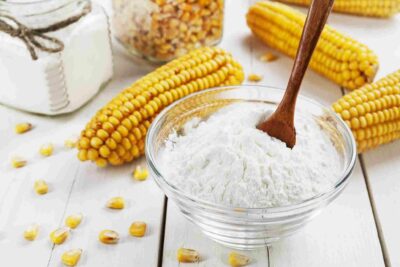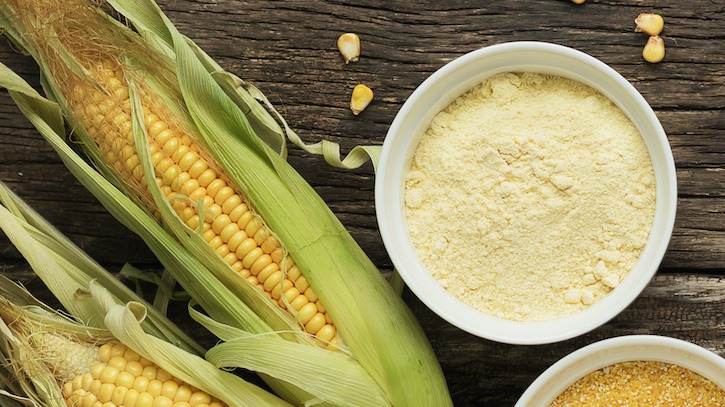What exactly are corn starch and corn flour?
As we examine the similarities and distinctions between corn starch and corn flour, it quickly becomes evident that their use cases are different, despite being made from the same ingredient.
The key difference between these two products is their processing because processing affects flavor, nutrition profile, and desired cooking technique. Because this processing method differs widely depending on what part of the world you live in, you may see many variations when looking for either product.
This article will outline all the necessary information to decide which type would work best for your needs!
Table of Contents
What is Corn Starch?

Corn starch is a type of carbohydrate that is used as an ingredient in many different food items. It is a fine, white powdery substance made from the endosperm of corn. It is often used as a thickening agent, binder, and stabilizer in foods like soups, sauces, gravies, puddings, desserts, and more.
What is Corn Flour?

Corn flour is a finely ground form of corn that is less gritty than corn starch. Unlike corn starch, it does not need to be soaked before use and can be used in baking recipes that call for flour.
However, because corn starch lacks nutrients in whole grains, like B vitamins and fiber, some nutritionists recommend adding fiber-rich ingredients like flaxseed or oatmeal when cooking with this flour.
Differences between Corn Starch and Corn Flour
Corn starch and corn flour are two different ingredients that can be used interchangeably in many recipes. Corn starch is made from corn and water, with the addition of a chemical to keep it from clumping. Corn flour, on the other hand, needs to be finely ground and sifted to remove its tough outer layer before cooking.
In the table below, we have listed a few basic differences between Corn Starch and Corn Flour to provide you with a better understanding.
| Corn Starch | Corn Flour |
| Corn starch is a fine white powder used as a thickening agent. | Corn Flour is a coarse yellow meal used as a baking ingredient. |
| Corn Starch has a neutral flavor. | Corn Flour has a slightly sweet, nutty flavor. |
| Corn Starch is made by grinding the endosperm of the corn kernel. | Corn Flour is made by grinding the entire Kernel after removing it from the husk. |
| Corn Starch is gluten-free. | Corn Flour may or may not be gluten-free, depending on its source. |
| Corn Starch is generally used as a binding agent. | Corn Flour is used as a binder, thickener, and leaving agent. |
Differences in nutritional values between Corn Starch and Corn Flour
These are some fundamental distinctions between Corn Starch and Corn Flour. However, the absolute difference between these two ingredients is their nutritional value. You can find the comparison of their nutritional values in the table below for 1/4th cup of each, i.e. about 29g.
| Corn Starch | Corn Flour | |
| Calories | 120 | 110 |
| Carbs (grams) | 28 | 22 |
| Fats (grams) | 0 | 1.5 |
| Proteins (grams) | 0 | 3 |
| Fibre (grams) | 0 | 2 |
In addition to the numbers representing the differences in both corn products, the products have different amounts of micronutrients. Corn Starch is almost devoid of any healthy amount of micronutrients. But corn flour is rich in vitamins like B6, and B5, and carries a healthy dose of minerals like iron, potassium, and magnesium.
Health Benefits of Corn Starch
- Weight Management: Corn starch is low in fat and calories, making it an excellent choice for those looking to manage their weight. It is also high in resistant starch, a dietary fiber that can help boost feelings of fullness and decrease appetite.
- Digestive Health: Corn starch can help promote regularity and healthy digestion. Additionally, resistant starch can help promote the growth of beneficial bacteria in the gut, which can improve digestive health.
- Skin Health: Corn starch can be used as a natural skin care product. It can help absorb excess oil and reduce shine, making it an excellent choice for those with oily skin.
Health Benefits of Corn Flour
- Weight Management: Corn flour is a low-calorie food when compared to other readily available flour. It makes for an ideal product if you are trying to manage your weight. It is full of complex carbohydrates, which are digested slowly, providing a steady energy source. It helps prevent sudden blood sugar drops that can lead to cravings and overeating.
- Rich in nutrients and antioxidants: Corn flour contains a good amount of phenolic components that are good in acting as antioxidants. It is found to contain higher levels of antioxidants than wheat flour. It is also rich in minerals and vitamins like iron, magnesium, B5, and B6.
- Digestive Health: Corn flour is high in dietary fiber and can help keep the digestive system healthy and functioning properly. The fiber content helps to bulk up stools, making them easier to pass and reducing the risk of constipation. It can also help to reduce the risk of colon cancer and other digestive disorders.
Recommendations for using Corn Starch and Corn Flour
Corn starch can be used as a thickening agent for sauces and gravies. Corn flour is an all-purpose flour that can be used in many baked goods like bread and cookies, but it needs to be mixed with other ingredients such as eggs, sugar, and butter.
If you have celiac disease, you should not use corn flour because it can contain gluten which is problematic for people with celiac disease. Numerous studies have indicated many cases of inflammation induced by corn in people with gluten sensitivities. Almost half of all celiac sufferers improve when abstaining from foods containing cereals like wheat, corn, rye, and barley.
Corn Flour is also often used by bakers to help create a light crust on baked goods. You can consider corn flour instead of all-purpose flour for dishes like pancakes, waffles, and crepes. Corn flour is widely used for frying food as it gives a crunchy texture. You can add corn flour to smoothies and shakes for a thicker consistency.
Final Words
In the end, it all boils down to a matter of taste and preferences. Suppose you are looking for a more nutritious option.
Corn starch could be the way to go if you want a more refined end result. Corn starch does not provide the necessary vitamins, minerals, or other nutrients for a healthy body. It will probably adversely affect your diet rather than improve it and have several negative side effects.
Choosing a nutritionally equivalent alternative like corn flour is preferable. Ensure that you discuss things with your nutritionist before making any significant changes to your diet.


